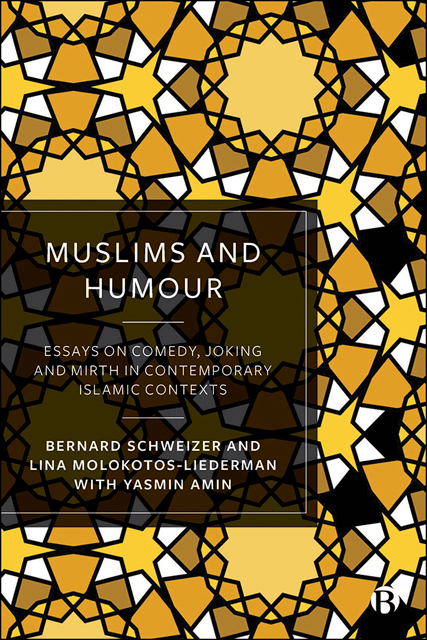Book contents
- Frontmatter
- Contents
- Notes on Contributors
- Acknowledgements
- Introduction
- Part I Theoretical Perspectives on Islam and Humour
- Part II Muslim Humour Practices in Islamicate Societies: Textual Media
- Part III Muslim Humour Practices in Islamicate Societies: Visual Media and Performance
- Part IV Muslim Comedy in North America
- Conclusion
- Bibliography on Islam and Humour
- Index
Conclusion
Published online by Cambridge University Press: 13 October 2022
- Frontmatter
- Contents
- Notes on Contributors
- Acknowledgements
- Introduction
- Part I Theoretical Perspectives on Islam and Humour
- Part II Muslim Humour Practices in Islamicate Societies: Textual Media
- Part III Muslim Humour Practices in Islamicate Societies: Visual Media and Performance
- Part IV Muslim Comedy in North America
- Conclusion
- Bibliography on Islam and Humour
- Index
Summary
The contributions in this volume explore a wide variety of humour practices related to Islamic/ Muslim contexts. Egyptian TV satire in the wake of the Arab Spring is the subject of Moutaz Alkheder's chapter on Bassem Youssef. Chourouq Nasri explores cartooning as a popular comical artform in the Arab world, examining how cartoonists navigate boundaries on comical licence. Ethnic joke cycles in Iran are documented in Fatemeh Nasr Esfahani's chapter, addressing both their conventional ethnic thematic and their religious subversiveness. The Qur’an, too, provides material for smiles, and Yasmin Amin discusses a plethora of deliberate appropriations (and misappropriations) of Qur’anic verses and passages (so-called iqtibās) for humorous effect. Joking as an anti-fundamentalist weapon – especially aimed against ISIS – is employed from both within the Arab world and from the West, as illustrated in Mona Abdel-Fadil's chapter. Joseph Alagha explores roles played by levity in Hizbullah's cultural programme, noting Hizbullah-internal disagreements about the status of humour. Shifting from humour expressions in the Muslim world to comedy by Muslims in North America, Jaclyn Michael explores the boldly uninhibited female Muslim stand-up acts in America, analyzing their take on gender, sexuality, and race. Jay Friesen looks closely at the successful Canadian TV series Little Mosque on the Prairie, finding that conventional comical sitcom strategies take precedence over any putative Muslim comical sensibilities.
These two chapters – on Muslim comedians and Muslim-themed humour in North America – point out that some differences do exist in the ways humour is presented and appreciated in Islamicate contexts as compared to non-Muslim-majority societies, where comedy by Muslims is found to be as uninhibited and irreverent as the larger sociocultural context would allow it to be. The first part of this book traces the roots of such observed differences. The three chapters by Mostafa Abedinifard, Georg Leube, and Walid Ghali delve into the historical, scriptural, and theological foundations for certain characteristic ways in which humour operates in Islamicate contexts. Abedinifard links Islamic bans on deprecatory, sarcastic, and mocking kinds of humour to the religion founders’ experience of ridicule as a powerful oppositional strategy employed by enemies of the incipient Muslim community.
- Type
- Chapter
- Information
- Muslims and HumourEssays on Comedy, Joking, and Mirth in Contemporary Islamic Contexts, pp. 271 - 278Publisher: Bristol University PressPrint publication year: 2022

